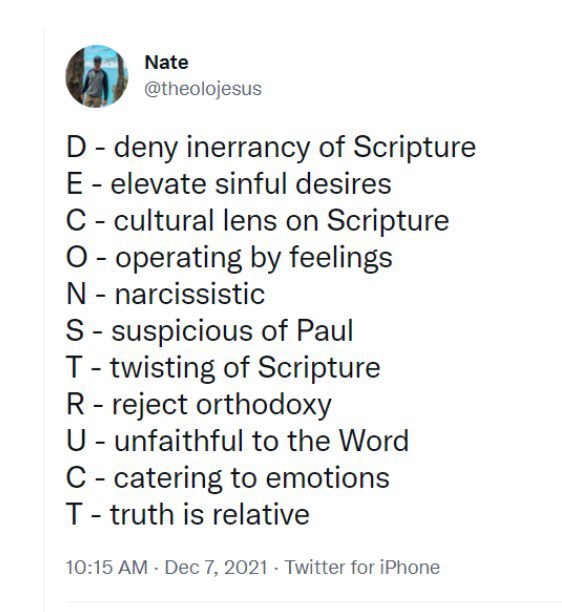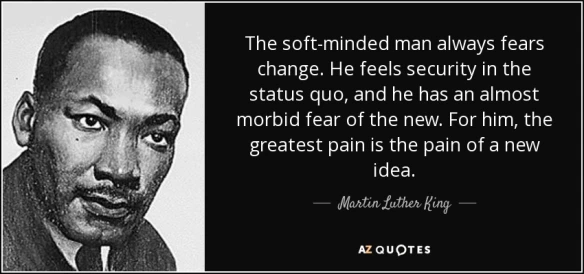
Scores of Evangelical Christians are questioning their beliefs, leading to what is commonly called “deconstruction.” Deconstruction is a process used to carefully examine beliefs and practices. Some people who deconstruct stay in their chosen belief system. Changes are made around the edges, belief-wise, but core doctrines remain unchanged. Others leave Evangelicalism, moving on to different sects and beliefs. Many people choose to reject religions, embracing spiritualism instead. And for others, deconstruction leads to a rejection of Christianity altogether. Many of these people become agnostics or atheists.
As more and more Evangelicals deconstruct, preachers take to their pulpits to “explain” why people deconstruct. More often than not, these preachers lie through their teeth as they give reasons for people deconstructing.
Over the weekend, I listened to a number of preachers attempting to explain why people deconstruct and leave their churches. Without exception, these so-called men of God lied about those leaving the faith. These preachers may be ignorant about deconstruction, but facts are but a Google search away. At best, these preachers are lazy. At worst, their objective is to smear the character of former believers, using former Christians as sermon illustrations or using them as a warning sign from God. I have critics who do this very thing by saying my health problems are a warning sign from God. “Look at what happened to Bruce Gerencser,” these preachers say. The problem with this line of stupidity is that my health problems predate my loss of faith. Any time I have a serious problem in my life, Evangelicals will claim that God is judging me for my alleged rebellion against the Almighty. How these Nostradamuses know their pronouncements are true is never stated. When I draw my last breath, you can count on these same critics taking to the Internet and their pulpits to say that I am now burning in Hell, facing the just consequences of having a doubting, questioning mind.
By far, the number one reason Evangelical preachers give for why people deconstruct is that the church has hurt them. While church hurt certainly plays a part in the deconversion process, I don’t know of anyone who says that “hurt” is the sole reason for walking away from Christianity. That said, Evangelical churches are known for shooting the wounded, sometimes causing mortal wounds. Go ahead and cross the preacher or disagree with him and see what happens. Go ahead and do or say something that the church’s power brokers (and every church has them) object to and see what happens. Oh wait, you know what will happen, because you have experienced it. Dare to walk your own path, expressing questions and doubts, and you will find yourself marginalized, ostracized, or excommunicated. Why would people want to remain in churches where they are treated as outsiders?
Another reason preachers use to explain why people deconstruct is that they secretly want to sin. Specifically, those who deconstruct want to commit licentious sexual immorality. Numerous critics of mine say that I left Evangelicalism because I am a closeted gay man. This, of course, is patently untrue. I don’t know of anyone who deconverted solely did so because they wanted to “sin.” Besides, the church has lots of “sinners” in its midst. The Black Collar Crime Series records the criminal behavior of over a thousand preachers — mostly Evangelicals who committed sex crimes. I have yet to read an article or hear a sermon about the problem Evangelicalism has with sexual misconduct. Why not focus on the “sin” within instead of judging, criticizing, and condemning those who are without?
Let me give you one more reason Evangelical preachers give for why people deconstruct. Preachers love to paint those who deconstruct as ignorant, superficial people; people who know very little about the Bible. This, of course, is patently untrue. Most of the people I know who deconverted spent countless hours re-examining their beliefs. What these preachers are most upset about is that the deconversion process exposes the shallowness of their preaching and calls into question what they teach and preach. Worse, it reveals that most Evangelical preachers are unable or unwilling to answer serious, challenging questions about Christianity and the Bible. When no suitable answers are forthcoming, people are told to just faith-it; that in time, God will soothe all doubts and answer all questions. People might have to wait until they die and enter the Pearly Gates, but all questions will one day be answered.
Most people deconvert because Evangelical Christianity no longer makes sense to them. Why are preachers afraid to admit that this is the primary reason people deconvert? To do so would call into question their ministry; their teaching, preaching, and way of life. Instead of serious introspection, preachers blame those who have lost their faith. (Please see The Michael Mock Rule: It Just Doesn’t Make Sense.)
If preachers truly want to know why people deconvert, I suggest that they actually talk to people who deconverted. Rarely does this happen. Most articles about deconversion are opinion pieces that lack any interviews with former Christians. Will preachers do this? Of course not. They have kingdoms and checkbooks to protect. I would love to be invited by local Evangelical churches to come share my journey from Evangelicalism to atheism. Surely, one former Christian’s testimony is no threat to the beliefs of others? Doesn’t the Bible say, “Greater is he that is in us, than he that is in the world?” I am no match for God, yet preachers fear that I will lead people astray if they ever hear from the horse’s mouth why I deconverted. Regardless, most Evangelicals have the Internet, and countless doubting/questioning Christians have contacted me for help. What reason do these people give for contacting me? Their pastors couldn’t or refused to answer their questions, or gave shallow, childish answers that they found unsatisfactory.
I suspect nothing will stem the tide of people deconstructing. It is clear, at least to me, that Evangelical churches/pastors/colleges have no answers for those who are desperately trying to hold on to their faith. Most doubters and questioners don’t want to deconvert, but the more they read and study, the more they realize that Evangelicalism no longer has answers for them. And when answers aren’t forthcoming, people will look elsewhere.
Bruce Gerencser, 68, lives in rural Northwest Ohio with his wife of 47 years. He and his wife have six grown children and sixteen grandchildren. Bruce pastored Evangelical churches for twenty-five years in Ohio, Texas, and Michigan. Bruce left the ministry in 2005, and in 2008 he left Christianity. Bruce is now a humanist and an atheist.
Your comments are welcome and appreciated. All first-time comments are moderated. Please read the commenting rules before commenting.
You can email Bruce via the Contact Form.









